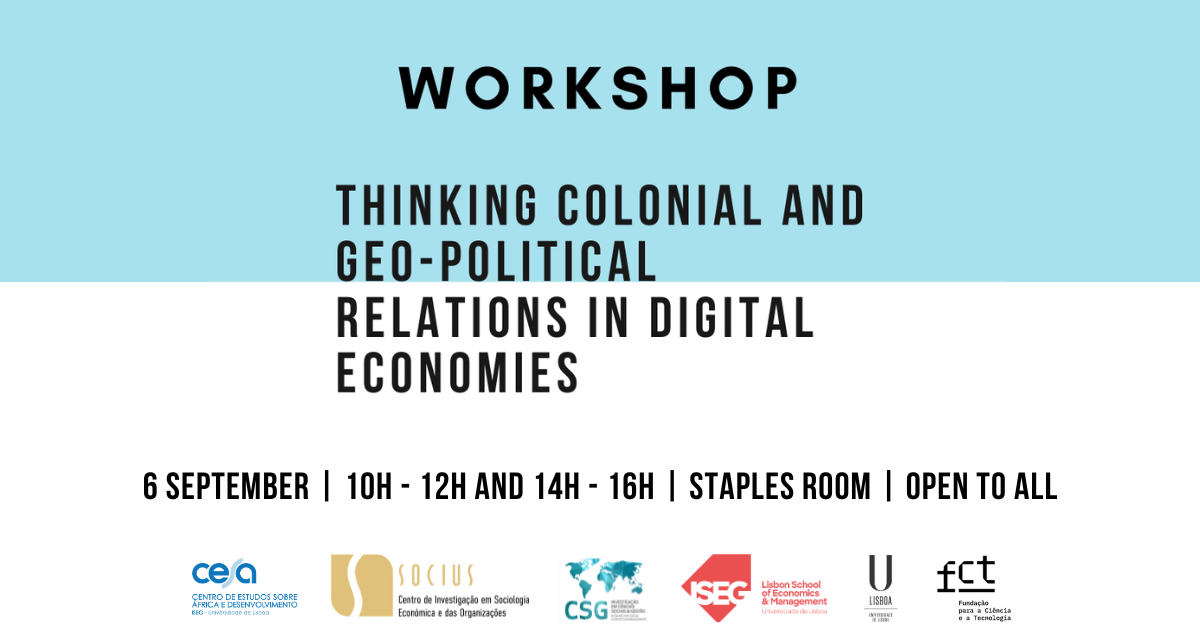CEsA and SOCIUS co-organize workshop on Digital Economies with free entry

📢 ❗ Attention: This workshop will take place in the Staples Room (Quelhas Building, 3rd floor) — not in the Delta Room as previously announced. ❗📢
CEsA – Centre for African and Development Studies and SOCIUS – Research Centre in Economic and Organizational Sociology, both research units of CSG – Research in Social Sciences and Management (ISEG-ULisboa), invite you to the Workshop “Thinking Colonial and Geo-Political Relations in Digital Economies: Mobile Financial Technology in Everyday Life,” which will take place on September 6, 2024, from 10:00 AM to 12:00 PM and from 2:00 PM to 4:00 PM, in Staples Room at ISEG (3rd Floor, Quelhas Building).
Digital Economies are growing globally and being promoted as sites of development of financial inclusion processes through digital technologies and mobile phones. Digital financial applications, including microfinance, but also cryptocurrencies, are expanding in Africa, side by side with the entrepreneurial use of social media. These technologies become the virtual and material sites of marketing of digital technologies as panaceas to pressing livelihood, financial management and subsistence problems. Often, it is through these pathways that digital economic media become deeply embedded in everyday personal, and social lives, influencing how people relate to each other, make a living, and become part of global systems that are negotiated within particular transnational historical, technological, political, social and cultural relations.
The aim of this workshop is to foster the exchange between researchers studying the power, economic, commercial, material, cultural, ontological, and social relations being forged into the development of digital economic media, as well as the ways in which these are operationalized and used in daily life, with the goal of jointly reflecting on new, collaborative and creative pathways for research and discussions.
Some central questions intended for discussion include:
- What do current narratives on digital financial inclusion in low-income settings tell us about the change and reproduction of historical, colonial and geopolitical power relationships?
- How do these relations appear in mundane aspects of people’s lives in different geographies? How are they negotiated?
- What are the symbolic dimensions of mobile phones, financial technology and applications, at the local level? How does this vary geographically and politically?
- Where is knowledge about these subjects being produced?
The workshop is free to attend, with no prior registration required. It is coordinated by SOCIUS researcher Inês Faria and is part of the research project “Digital Microfinance and Financial Ecologies: Gender and Entrepreneurship in Maputo and Chibuto.”
Participants presenting their work include invited speakers Euclides Gonçalves (Kaleidoscope) and Serena Natile (University of Warwick), CEsA researchers Luís Bernardo and Diogo Maia, SOCIUS researcher and Ph.D. candidate in Economic and Organizational Sociology Eduardo Ferracioli, and Political Economy Ph.D. candidates Henrique Pinto Coelho, Felipe Rodrigues, and Thiago França.
Check out below the papers that will be presented by CEsA researchers
Title: The Impact of FDI on Economic Growth and Inequality in Mozambique: An analysis of the first two decades of the 21st century
 Author: Diogo Maia
Author: Diogo Maia
Abstract: This study conducts a comprehensive analysis of the relationship between Foreign Direct Investment (FDI), economic growth, and inequality in Mozambique during the first two decades of the 21st century. The primary objective is to determine whether FDI has contributed to economic growth and to assess whether this growth has led to greater equality or exacerbated inequality. The research methodology involved a data analysis framework, utilizing microdata from Family Budget Surveys in conjunction with macrodata from diverse sources to quantitatively assess the effects of FDI on the Mozambican economy.
The results indicate that while FDI has been a significant driver of economic growth, particularly in the natural resource sectors, this growth has been highly concentrated and insufficiently inclusive, leading to a widening of regional and social inequalities. The influx of FDI has primarily targeted capital-intensive sectors, with the resultant economic benefits disproportionately accruing to a narrow elite, thereby limiting broader economic development and employment generation.
Within the context of Mozambique — a nation characterized by its reliance on extractive industries and susceptibility to external economic shocks — these findings suggest that FDI-driven growth may, paradoxically, contribute to deepening existing inequalities. The study concludes that for FDI to promote more equitable and sustainable growth, strategic policies must be implemented to diversify the economy and ensure a more equitable distribution of the gains from foreign investment.
Title: Geoeconomics and Digital Competition: The Global Gateway, infrastructural power and governed interpendence beyond nation-States
 Author: Luís Bernardo
Author: Luís Bernardo
Abstract: This paper examines the digital component of the Global Gateway strategy. I mobilize the concepts of governed interdependence and infrastructural power to understand how the EU – and its current developmental avatar, Team Europe – is shifting its repertoire to suit a more competitive, if not exactly confrontational world order. Since 2021, the European Union has promoted the Global Gateway as the €300bn European move in the “global battle of offers” in infrastructure investment. This strategy aims to build “smart, clean and secure links” across systems worldwide. It is the European counterpart to the Chinese Belt and Road Initiative (BRI) and the US Build Back Better World (B3W). Importantly, the von der Leyen Commission has mobilized development cooperation resources in order to kickstart the Global Gateway: indeed, NDICI – Global Europe is the 2021-2027 EU financial envelope for development cooperation and, as it stands, it remains the world’s largest. The Global Gateway comprises five sectoral priorities: climate and energy, the digital sector, education and research, health and transport. Though there is significant overlap among each sectoral priority, the digital component is striking as it illustrates how the hybrid character of EU power, namely its material capacity to implement projects and its regulatory capacity to define how projects ought to be implemented.
In this paper, I underline the importance of business actors – mainly but not exclusively private – in the enactment and projection of geoeconomic power through the digital component of Global Gateway: if digital connectivity requires data, it also requires infrastructure, regulatory standards and governance capacity, none of which the EU as a whole or member-States and their development agencies are able to deploy independently from European business. In this sense, governed interdependence, understood as the set of strategies employed by States in their interaction with actors under their jurisdiction in order to shape relations with global markets, is potentially useful to understand where the Global Gateway is going and where it is leading the EU. Finally, this paper also discusses infrastructural power as a competitive edge in the “global battle of offers”: if the Brussels Effect applies to the Global Gateway, it would be a clear instance of infrastructural power beyond the scope of EU territorial sovereignty and thus part of the global movement towards a “new economic statecraft”. This paper discusses these issues as they relate to the digital component of the Global Gateway.
Author: CEsA Communication (comunicacao@cesa.iseg.ulisboa.pt)
Images: CEsA/Reproduction





